Personal and Professional Development
VerifiedAdded on 2023/01/10
|8
|2057
|95
AI Summary
This report discusses the concept of personal and professional development and its significance in individual and organizational growth. It explores various employability skills such as leadership, teamwork, time management, and communication. The report also delves into Kolb's reflective model and its role in the learning process. It provides resources and references for further reading on the topic.
Contribute Materials
Your contribution can guide someone’s learning journey. Share your
documents today.
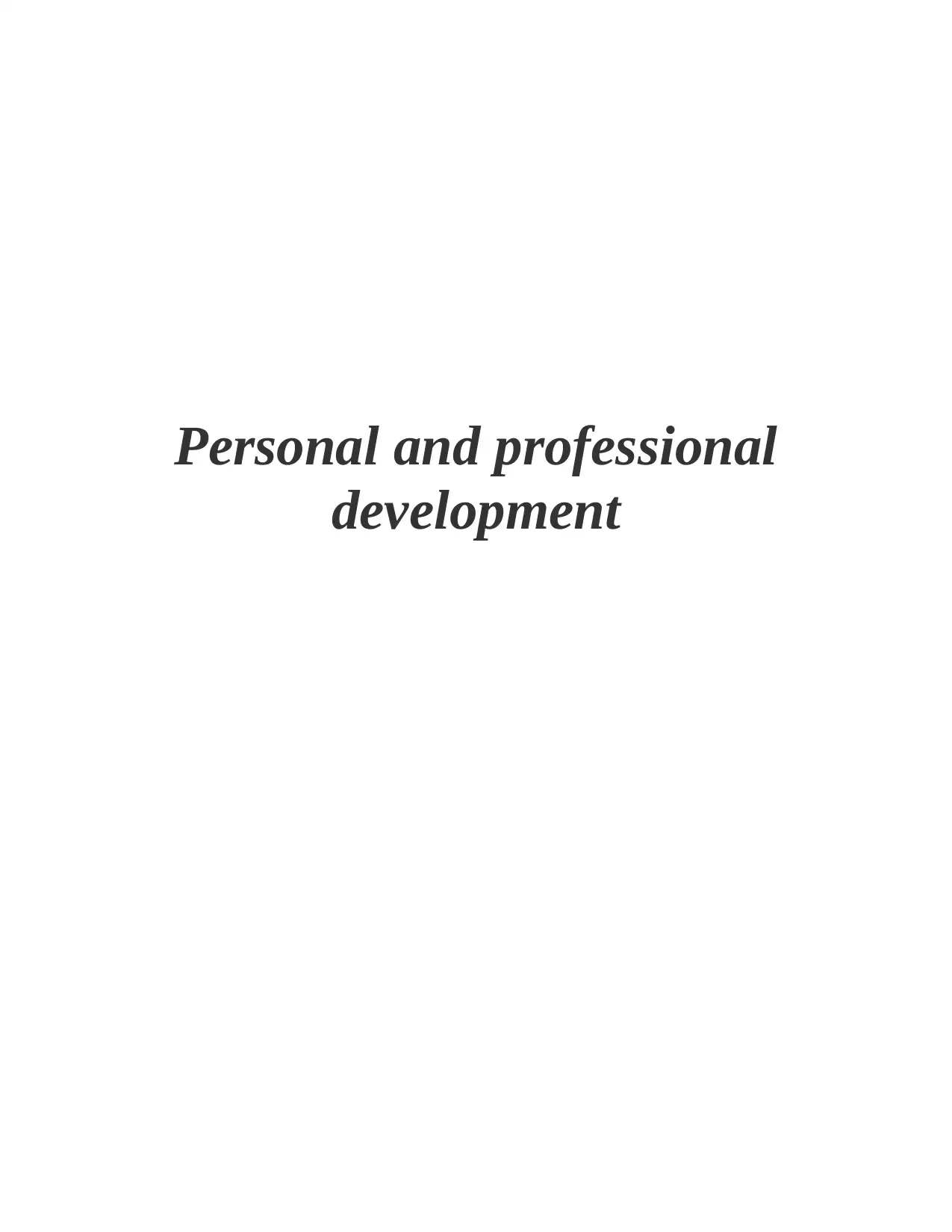
Personal and professional
development
development
Secure Best Marks with AI Grader
Need help grading? Try our AI Grader for instant feedback on your assignments.
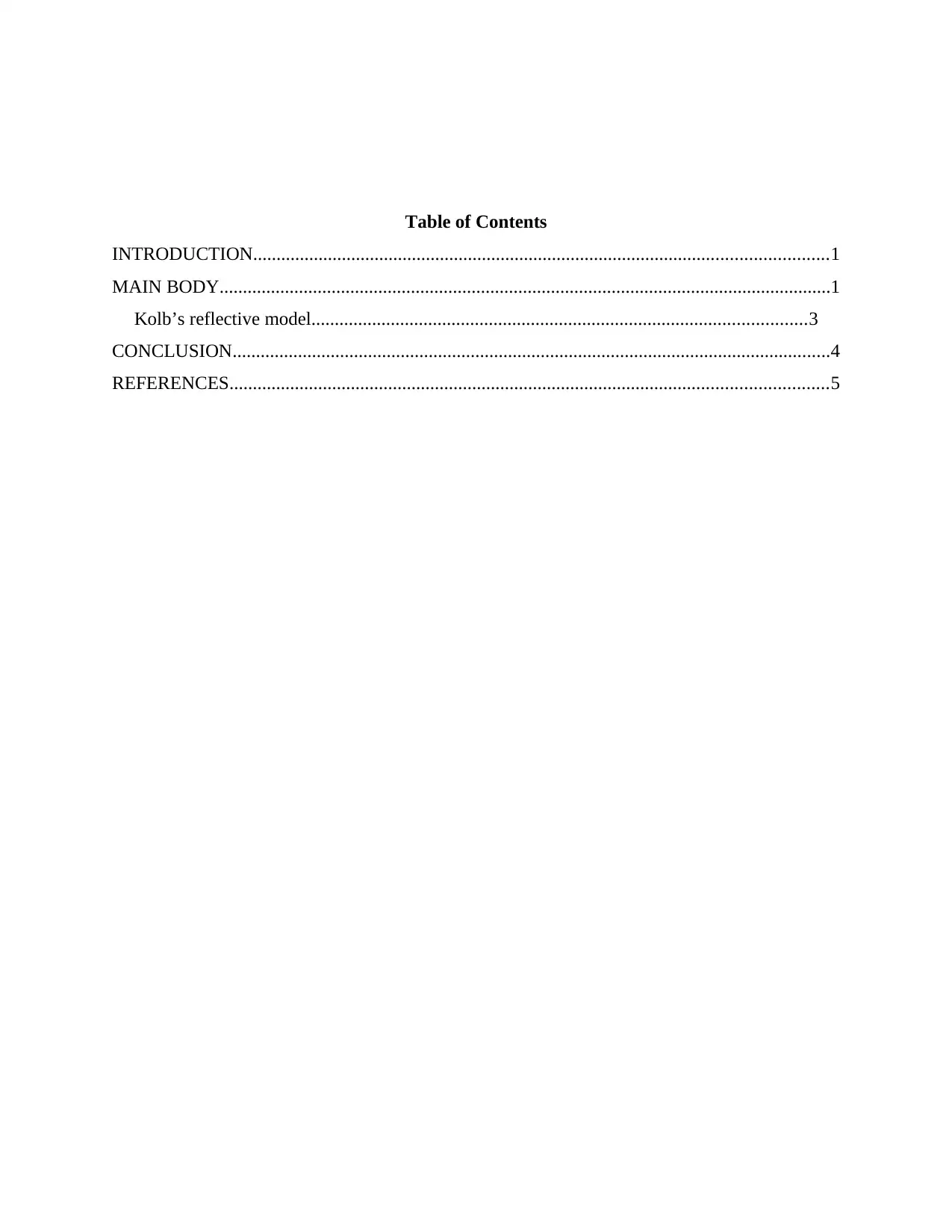
Table of Contents
INTRODUCTION...........................................................................................................................1
MAIN BODY...................................................................................................................................1
Kolb’s reflective model..........................................................................................................3
CONCLUSION................................................................................................................................4
REFERENCES................................................................................................................................5
INTRODUCTION...........................................................................................................................1
MAIN BODY...................................................................................................................................1
Kolb’s reflective model..........................................................................................................3
CONCLUSION................................................................................................................................4
REFERENCES................................................................................................................................5
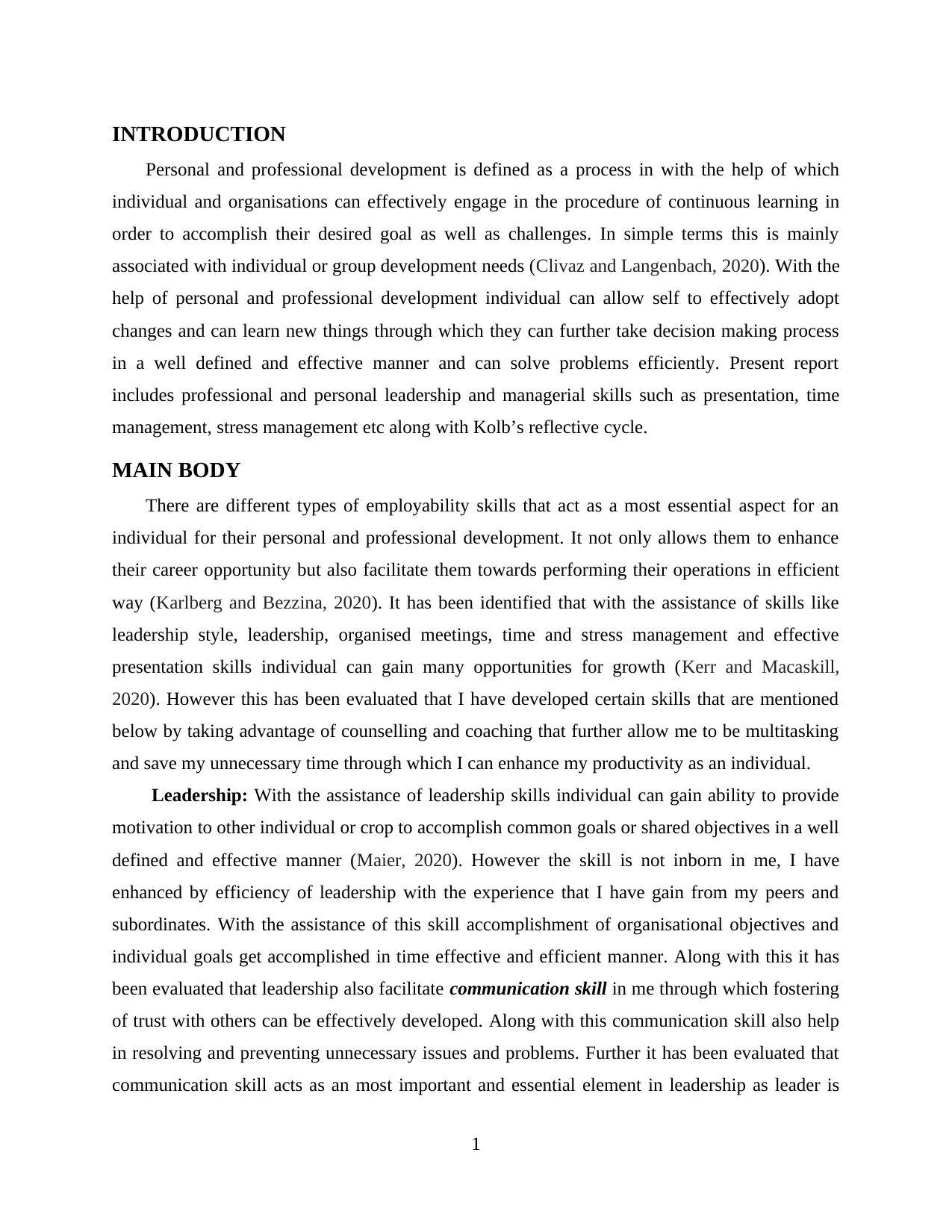
INTRODUCTION
Personal and professional development is defined as a process in with the help of which
individual and organisations can effectively engage in the procedure of continuous learning in
order to accomplish their desired goal as well as challenges. In simple terms this is mainly
associated with individual or group development needs (Clivaz and Langenbach, 2020). With the
help of personal and professional development individual can allow self to effectively adopt
changes and can learn new things through which they can further take decision making process
in a well defined and effective manner and can solve problems efficiently. Present report
includes professional and personal leadership and managerial skills such as presentation, time
management, stress management etc along with Kolb’s reflective cycle.
MAIN BODY
There are different types of employability skills that act as a most essential aspect for an
individual for their personal and professional development. It not only allows them to enhance
their career opportunity but also facilitate them towards performing their operations in efficient
way (Karlberg and Bezzina, 2020). It has been identified that with the assistance of skills like
leadership style, leadership, organised meetings, time and stress management and effective
presentation skills individual can gain many opportunities for growth (Kerr and Macaskill,
2020). However this has been evaluated that I have developed certain skills that are mentioned
below by taking advantage of counselling and coaching that further allow me to be multitasking
and save my unnecessary time through which I can enhance my productivity as an individual.
Leadership: With the assistance of leadership skills individual can gain ability to provide
motivation to other individual or crop to accomplish common goals or shared objectives in a well
defined and effective manner (Maier, 2020). However the skill is not inborn in me, I have
enhanced by efficiency of leadership with the experience that I have gain from my peers and
subordinates. With the assistance of this skill accomplishment of organisational objectives and
individual goals get accomplished in time effective and efficient manner. Along with this it has
been evaluated that leadership also facilitate communication skill in me through which fostering
of trust with others can be effectively developed. Along with this communication skill also help
in resolving and preventing unnecessary issues and problems. Further it has been evaluated that
communication skill acts as an most important and essential element in leadership as leader is
1
Personal and professional development is defined as a process in with the help of which
individual and organisations can effectively engage in the procedure of continuous learning in
order to accomplish their desired goal as well as challenges. In simple terms this is mainly
associated with individual or group development needs (Clivaz and Langenbach, 2020). With the
help of personal and professional development individual can allow self to effectively adopt
changes and can learn new things through which they can further take decision making process
in a well defined and effective manner and can solve problems efficiently. Present report
includes professional and personal leadership and managerial skills such as presentation, time
management, stress management etc along with Kolb’s reflective cycle.
MAIN BODY
There are different types of employability skills that act as a most essential aspect for an
individual for their personal and professional development. It not only allows them to enhance
their career opportunity but also facilitate them towards performing their operations in efficient
way (Karlberg and Bezzina, 2020). It has been identified that with the assistance of skills like
leadership style, leadership, organised meetings, time and stress management and effective
presentation skills individual can gain many opportunities for growth (Kerr and Macaskill,
2020). However this has been evaluated that I have developed certain skills that are mentioned
below by taking advantage of counselling and coaching that further allow me to be multitasking
and save my unnecessary time through which I can enhance my productivity as an individual.
Leadership: With the assistance of leadership skills individual can gain ability to provide
motivation to other individual or crop to accomplish common goals or shared objectives in a well
defined and effective manner (Maier, 2020). However the skill is not inborn in me, I have
enhanced by efficiency of leadership with the experience that I have gain from my peers and
subordinates. With the assistance of this skill accomplishment of organisational objectives and
individual goals get accomplished in time effective and efficient manner. Along with this it has
been evaluated that leadership also facilitate communication skill in me through which fostering
of trust with others can be effectively developed. Along with this communication skill also help
in resolving and preventing unnecessary issues and problems. Further it has been evaluated that
communication skill acts as an most important and essential element in leadership as leader is
1
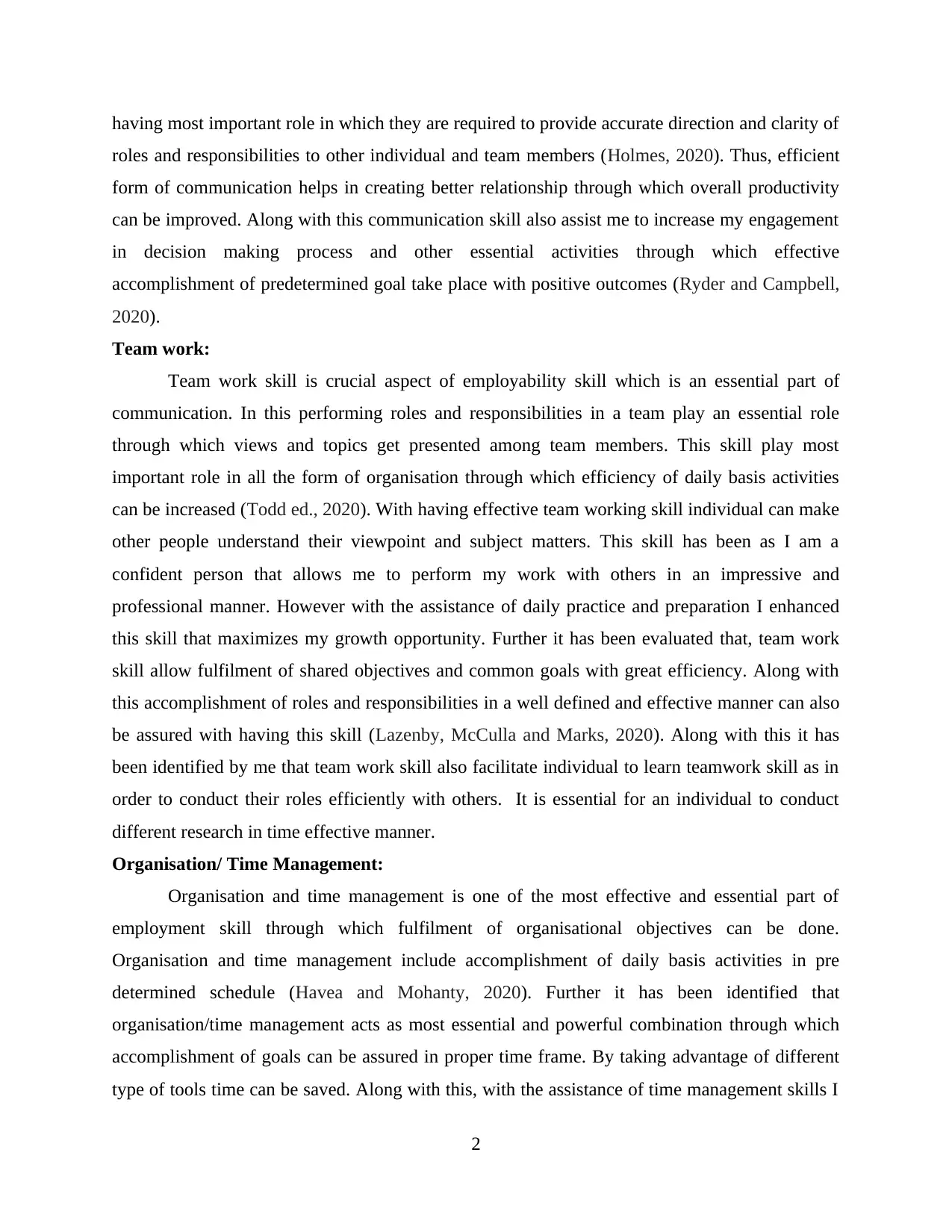
having most important role in which they are required to provide accurate direction and clarity of
roles and responsibilities to other individual and team members (Holmes, 2020). Thus, efficient
form of communication helps in creating better relationship through which overall productivity
can be improved. Along with this communication skill also assist me to increase my engagement
in decision making process and other essential activities through which effective
accomplishment of predetermined goal take place with positive outcomes (Ryder and Campbell,
2020).
Team work:
Team work skill is crucial aspect of employability skill which is an essential part of
communication. In this performing roles and responsibilities in a team play an essential role
through which views and topics get presented among team members. This skill play most
important role in all the form of organisation through which efficiency of daily basis activities
can be increased (Todd ed., 2020). With having effective team working skill individual can make
other people understand their viewpoint and subject matters. This skill has been as I am a
confident person that allows me to perform my work with others in an impressive and
professional manner. However with the assistance of daily practice and preparation I enhanced
this skill that maximizes my growth opportunity. Further it has been evaluated that, team work
skill allow fulfilment of shared objectives and common goals with great efficiency. Along with
this accomplishment of roles and responsibilities in a well defined and effective manner can also
be assured with having this skill (Lazenby, McCulla and Marks, 2020). Along with this it has
been identified by me that team work skill also facilitate individual to learn teamwork skill as in
order to conduct their roles efficiently with others. It is essential for an individual to conduct
different research in time effective manner.
Organisation/ Time Management:
Organisation and time management is one of the most effective and essential part of
employment skill through which fulfilment of organisational objectives can be done.
Organisation and time management include accomplishment of daily basis activities in pre
determined schedule (Havea and Mohanty, 2020). Further it has been identified that
organisation/time management acts as most essential and powerful combination through which
accomplishment of goals can be assured in proper time frame. By taking advantage of different
type of tools time can be saved. Along with this, with the assistance of time management skills I
2
roles and responsibilities to other individual and team members (Holmes, 2020). Thus, efficient
form of communication helps in creating better relationship through which overall productivity
can be improved. Along with this communication skill also assist me to increase my engagement
in decision making process and other essential activities through which effective
accomplishment of predetermined goal take place with positive outcomes (Ryder and Campbell,
2020).
Team work:
Team work skill is crucial aspect of employability skill which is an essential part of
communication. In this performing roles and responsibilities in a team play an essential role
through which views and topics get presented among team members. This skill play most
important role in all the form of organisation through which efficiency of daily basis activities
can be increased (Todd ed., 2020). With having effective team working skill individual can make
other people understand their viewpoint and subject matters. This skill has been as I am a
confident person that allows me to perform my work with others in an impressive and
professional manner. However with the assistance of daily practice and preparation I enhanced
this skill that maximizes my growth opportunity. Further it has been evaluated that, team work
skill allow fulfilment of shared objectives and common goals with great efficiency. Along with
this accomplishment of roles and responsibilities in a well defined and effective manner can also
be assured with having this skill (Lazenby, McCulla and Marks, 2020). Along with this it has
been identified by me that team work skill also facilitate individual to learn teamwork skill as in
order to conduct their roles efficiently with others. It is essential for an individual to conduct
different research in time effective manner.
Organisation/ Time Management:
Organisation and time management is one of the most effective and essential part of
employment skill through which fulfilment of organisational objectives can be done.
Organisation and time management include accomplishment of daily basis activities in pre
determined schedule (Havea and Mohanty, 2020). Further it has been identified that
organisation/time management acts as most essential and powerful combination through which
accomplishment of goals can be assured in proper time frame. By taking advantage of different
type of tools time can be saved. Along with this, with the assistance of time management skills I
2
Secure Best Marks with AI Grader
Need help grading? Try our AI Grader for instant feedback on your assignments.
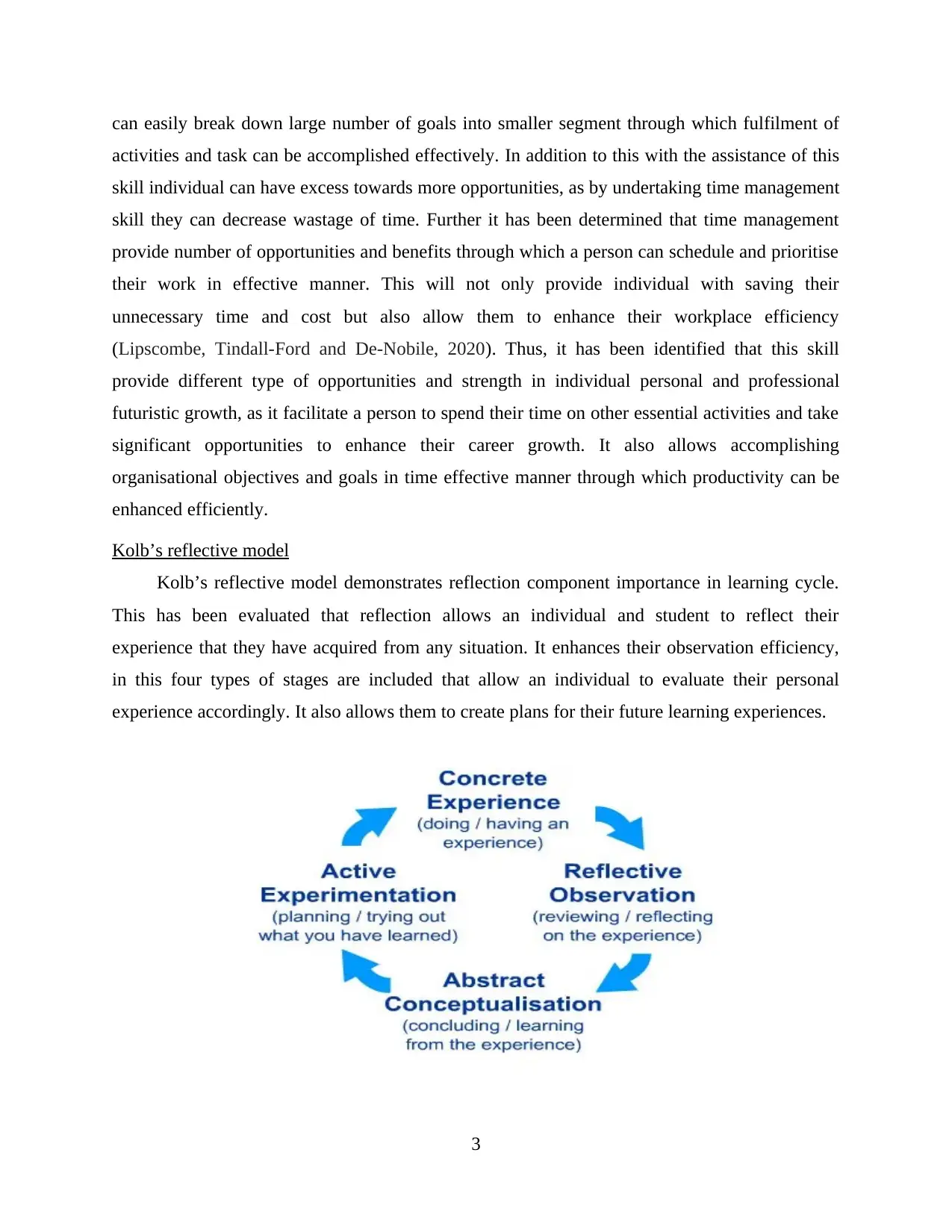
can easily break down large number of goals into smaller segment through which fulfilment of
activities and task can be accomplished effectively. In addition to this with the assistance of this
skill individual can have excess towards more opportunities, as by undertaking time management
skill they can decrease wastage of time. Further it has been determined that time management
provide number of opportunities and benefits through which a person can schedule and prioritise
their work in effective manner. This will not only provide individual with saving their
unnecessary time and cost but also allow them to enhance their workplace efficiency
(Lipscombe, Tindall-Ford and De-Nobile, 2020). Thus, it has been identified that this skill
provide different type of opportunities and strength in individual personal and professional
futuristic growth, as it facilitate a person to spend their time on other essential activities and take
significant opportunities to enhance their career growth. It also allows accomplishing
organisational objectives and goals in time effective manner through which productivity can be
enhanced efficiently.
Kolb’s reflective model
Kolb’s reflective model demonstrates reflection component importance in learning cycle.
This has been evaluated that reflection allows an individual and student to reflect their
experience that they have acquired from any situation. It enhances their observation efficiency,
in this four types of stages are included that allow an individual to evaluate their personal
experience accordingly. It also allows them to create plans for their future learning experiences.
3
activities and task can be accomplished effectively. In addition to this with the assistance of this
skill individual can have excess towards more opportunities, as by undertaking time management
skill they can decrease wastage of time. Further it has been determined that time management
provide number of opportunities and benefits through which a person can schedule and prioritise
their work in effective manner. This will not only provide individual with saving their
unnecessary time and cost but also allow them to enhance their workplace efficiency
(Lipscombe, Tindall-Ford and De-Nobile, 2020). Thus, it has been identified that this skill
provide different type of opportunities and strength in individual personal and professional
futuristic growth, as it facilitate a person to spend their time on other essential activities and take
significant opportunities to enhance their career growth. It also allows accomplishing
organisational objectives and goals in time effective manner through which productivity can be
enhanced efficiently.
Kolb’s reflective model
Kolb’s reflective model demonstrates reflection component importance in learning cycle.
This has been evaluated that reflection allows an individual and student to reflect their
experience that they have acquired from any situation. It enhances their observation efficiency,
in this four types of stages are included that allow an individual to evaluate their personal
experience accordingly. It also allows them to create plans for their future learning experiences.
3
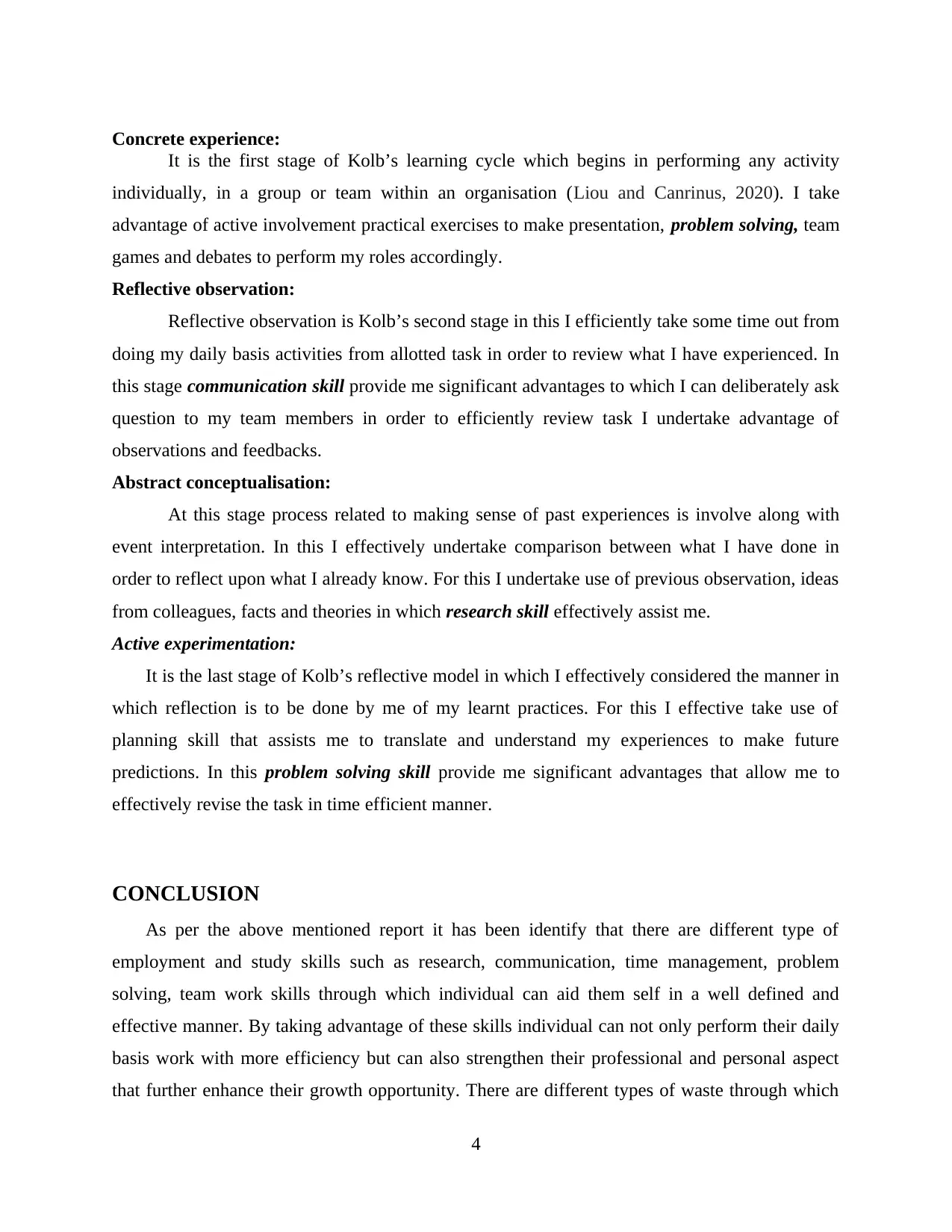
Concrete experience:
It is the first stage of Kolb’s learning cycle which begins in performing any activity
individually, in a group or team within an organisation (Liou and Canrinus, 2020). I take
advantage of active involvement practical exercises to make presentation, problem solving, team
games and debates to perform my roles accordingly.
Reflective observation:
Reflective observation is Kolb’s second stage in this I efficiently take some time out from
doing my daily basis activities from allotted task in order to review what I have experienced. In
this stage communication skill provide me significant advantages to which I can deliberately ask
question to my team members in order to efficiently review task I undertake advantage of
observations and feedbacks.
Abstract conceptualisation:
At this stage process related to making sense of past experiences is involve along with
event interpretation. In this I effectively undertake comparison between what I have done in
order to reflect upon what I already know. For this I undertake use of previous observation, ideas
from colleagues, facts and theories in which research skill effectively assist me.
Active experimentation:
It is the last stage of Kolb’s reflective model in which I effectively considered the manner in
which reflection is to be done by me of my learnt practices. For this I effective take use of
planning skill that assists me to translate and understand my experiences to make future
predictions. In this problem solving skill provide me significant advantages that allow me to
effectively revise the task in time efficient manner.
CONCLUSION
As per the above mentioned report it has been identify that there are different type of
employment and study skills such as research, communication, time management, problem
solving, team work skills through which individual can aid them self in a well defined and
effective manner. By taking advantage of these skills individual can not only perform their daily
basis work with more efficiency but can also strengthen their professional and personal aspect
that further enhance their growth opportunity. There are different types of waste through which
4
It is the first stage of Kolb’s learning cycle which begins in performing any activity
individually, in a group or team within an organisation (Liou and Canrinus, 2020). I take
advantage of active involvement practical exercises to make presentation, problem solving, team
games and debates to perform my roles accordingly.
Reflective observation:
Reflective observation is Kolb’s second stage in this I efficiently take some time out from
doing my daily basis activities from allotted task in order to review what I have experienced. In
this stage communication skill provide me significant advantages to which I can deliberately ask
question to my team members in order to efficiently review task I undertake advantage of
observations and feedbacks.
Abstract conceptualisation:
At this stage process related to making sense of past experiences is involve along with
event interpretation. In this I effectively undertake comparison between what I have done in
order to reflect upon what I already know. For this I undertake use of previous observation, ideas
from colleagues, facts and theories in which research skill effectively assist me.
Active experimentation:
It is the last stage of Kolb’s reflective model in which I effectively considered the manner in
which reflection is to be done by me of my learnt practices. For this I effective take use of
planning skill that assists me to translate and understand my experiences to make future
predictions. In this problem solving skill provide me significant advantages that allow me to
effectively revise the task in time efficient manner.
CONCLUSION
As per the above mentioned report it has been identify that there are different type of
employment and study skills such as research, communication, time management, problem
solving, team work skills through which individual can aid them self in a well defined and
effective manner. By taking advantage of these skills individual can not only perform their daily
basis work with more efficiency but can also strengthen their professional and personal aspect
that further enhance their growth opportunity. There are different types of waste through which
4
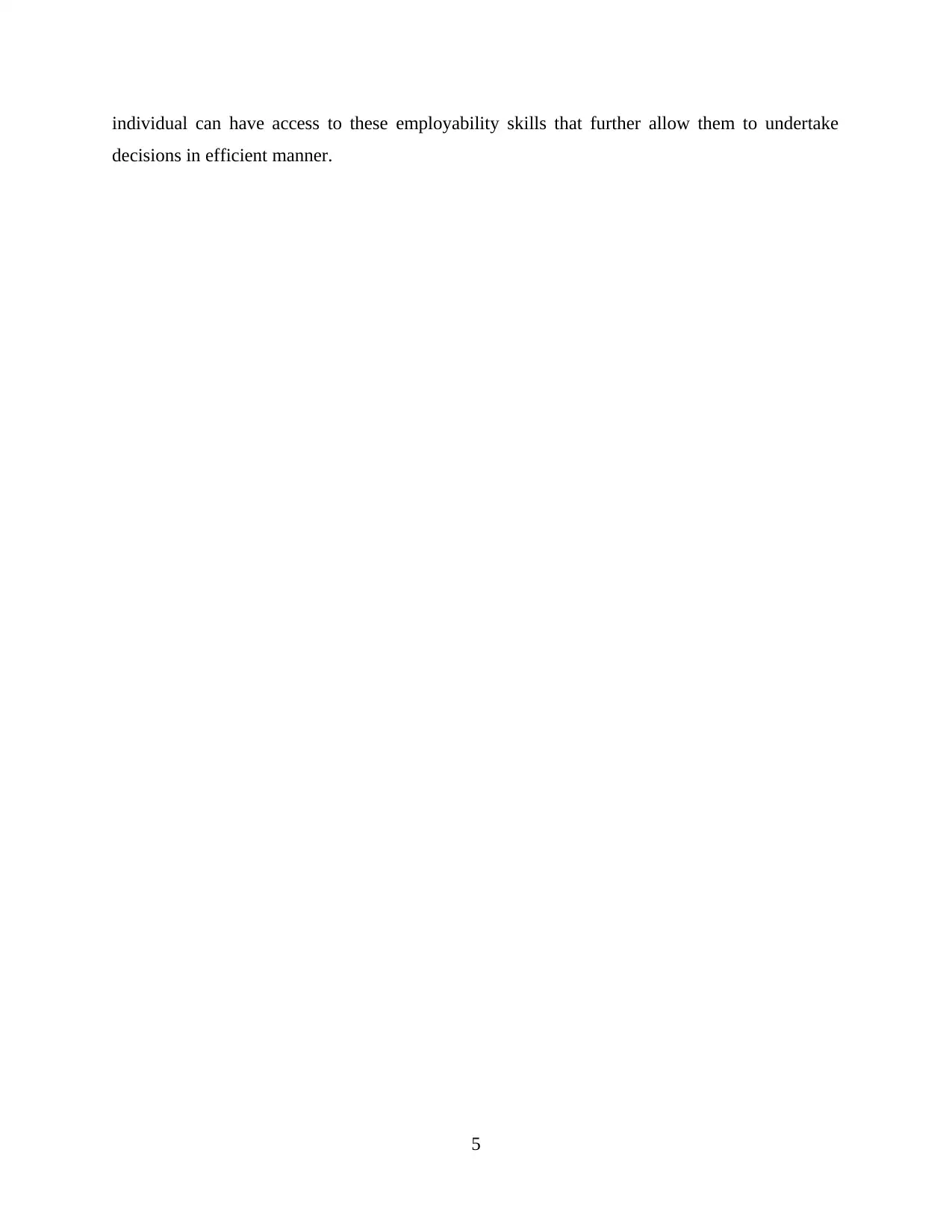
individual can have access to these employability skills that further allow them to undertake
decisions in efficient manner.
5
decisions in efficient manner.
5
Paraphrase This Document
Need a fresh take? Get an instant paraphrase of this document with our AI Paraphraser
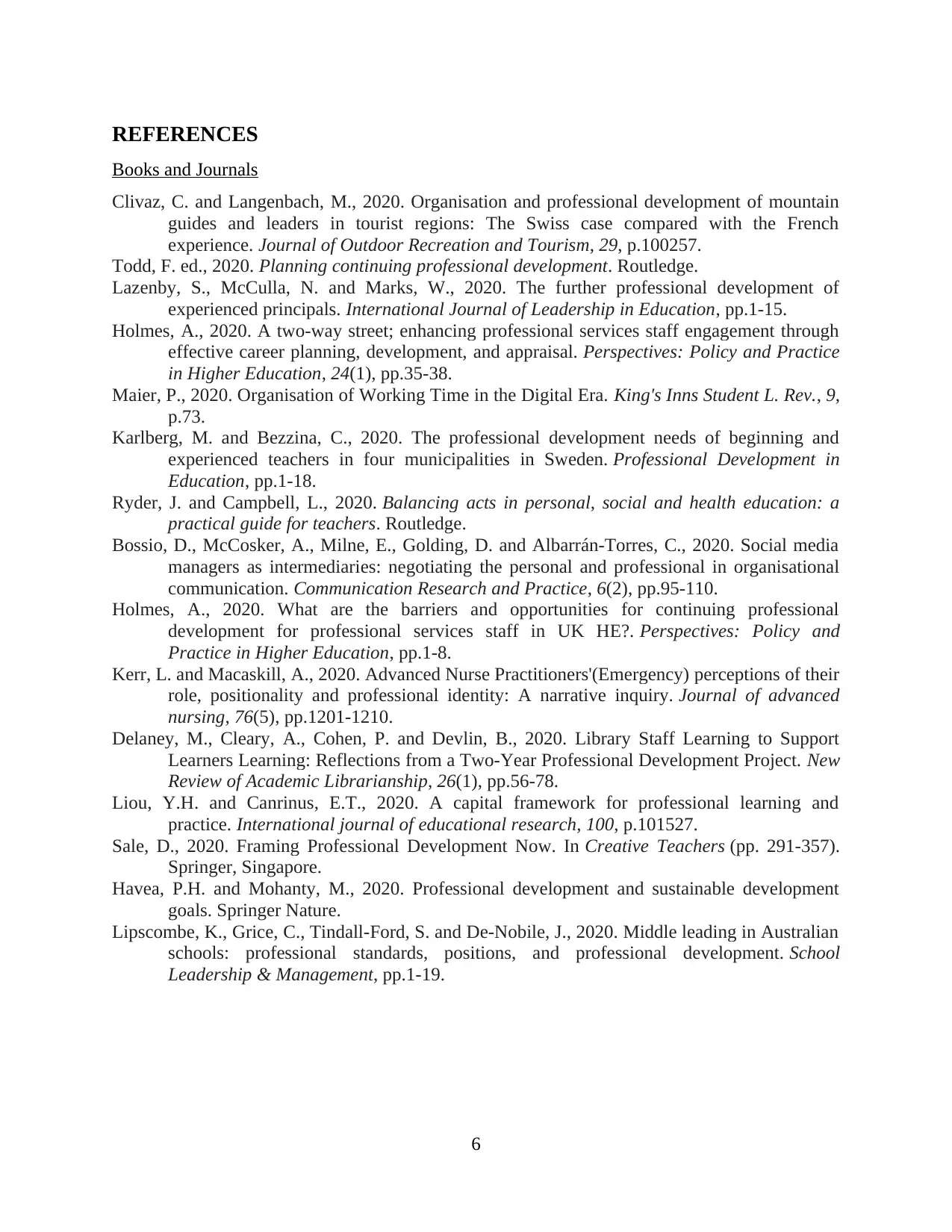
REFERENCES
Books and Journals
Clivaz, C. and Langenbach, M., 2020. Organisation and professional development of mountain
guides and leaders in tourist regions: The Swiss case compared with the French
experience. Journal of Outdoor Recreation and Tourism, 29, p.100257.
Todd, F. ed., 2020. Planning continuing professional development. Routledge.
Lazenby, S., McCulla, N. and Marks, W., 2020. The further professional development of
experienced principals. International Journal of Leadership in Education, pp.1-15.
Holmes, A., 2020. A two-way street; enhancing professional services staff engagement through
effective career planning, development, and appraisal. Perspectives: Policy and Practice
in Higher Education, 24(1), pp.35-38.
Maier, P., 2020. Organisation of Working Time in the Digital Era. King's Inns Student L. Rev., 9,
p.73.
Karlberg, M. and Bezzina, C., 2020. The professional development needs of beginning and
experienced teachers in four municipalities in Sweden. Professional Development in
Education, pp.1-18.
Ryder, J. and Campbell, L., 2020. Balancing acts in personal, social and health education: a
practical guide for teachers. Routledge.
Bossio, D., McCosker, A., Milne, E., Golding, D. and Albarrán-Torres, C., 2020. Social media
managers as intermediaries: negotiating the personal and professional in organisational
communication. Communication Research and Practice, 6(2), pp.95-110.
Holmes, A., 2020. What are the barriers and opportunities for continuing professional
development for professional services staff in UK HE?. Perspectives: Policy and
Practice in Higher Education, pp.1-8.
Kerr, L. and Macaskill, A., 2020. Advanced Nurse Practitioners'(Emergency) perceptions of their
role, positionality and professional identity: A narrative inquiry. Journal of advanced
nursing, 76(5), pp.1201-1210.
Delaney, M., Cleary, A., Cohen, P. and Devlin, B., 2020. Library Staff Learning to Support
Learners Learning: Reflections from a Two-Year Professional Development Project. New
Review of Academic Librarianship, 26(1), pp.56-78.
Liou, Y.H. and Canrinus, E.T., 2020. A capital framework for professional learning and
practice. International journal of educational research, 100, p.101527.
Sale, D., 2020. Framing Professional Development Now. In Creative Teachers (pp. 291-357).
Springer, Singapore.
Havea, P.H. and Mohanty, M., 2020. Professional development and sustainable development
goals. Springer Nature.
Lipscombe, K., Grice, C., Tindall-Ford, S. and De-Nobile, J., 2020. Middle leading in Australian
schools: professional standards, positions, and professional development. School
Leadership & Management, pp.1-19.
6
Books and Journals
Clivaz, C. and Langenbach, M., 2020. Organisation and professional development of mountain
guides and leaders in tourist regions: The Swiss case compared with the French
experience. Journal of Outdoor Recreation and Tourism, 29, p.100257.
Todd, F. ed., 2020. Planning continuing professional development. Routledge.
Lazenby, S., McCulla, N. and Marks, W., 2020. The further professional development of
experienced principals. International Journal of Leadership in Education, pp.1-15.
Holmes, A., 2020. A two-way street; enhancing professional services staff engagement through
effective career planning, development, and appraisal. Perspectives: Policy and Practice
in Higher Education, 24(1), pp.35-38.
Maier, P., 2020. Organisation of Working Time in the Digital Era. King's Inns Student L. Rev., 9,
p.73.
Karlberg, M. and Bezzina, C., 2020. The professional development needs of beginning and
experienced teachers in four municipalities in Sweden. Professional Development in
Education, pp.1-18.
Ryder, J. and Campbell, L., 2020. Balancing acts in personal, social and health education: a
practical guide for teachers. Routledge.
Bossio, D., McCosker, A., Milne, E., Golding, D. and Albarrán-Torres, C., 2020. Social media
managers as intermediaries: negotiating the personal and professional in organisational
communication. Communication Research and Practice, 6(2), pp.95-110.
Holmes, A., 2020. What are the barriers and opportunities for continuing professional
development for professional services staff in UK HE?. Perspectives: Policy and
Practice in Higher Education, pp.1-8.
Kerr, L. and Macaskill, A., 2020. Advanced Nurse Practitioners'(Emergency) perceptions of their
role, positionality and professional identity: A narrative inquiry. Journal of advanced
nursing, 76(5), pp.1201-1210.
Delaney, M., Cleary, A., Cohen, P. and Devlin, B., 2020. Library Staff Learning to Support
Learners Learning: Reflections from a Two-Year Professional Development Project. New
Review of Academic Librarianship, 26(1), pp.56-78.
Liou, Y.H. and Canrinus, E.T., 2020. A capital framework for professional learning and
practice. International journal of educational research, 100, p.101527.
Sale, D., 2020. Framing Professional Development Now. In Creative Teachers (pp. 291-357).
Springer, Singapore.
Havea, P.H. and Mohanty, M., 2020. Professional development and sustainable development
goals. Springer Nature.
Lipscombe, K., Grice, C., Tindall-Ford, S. and De-Nobile, J., 2020. Middle leading in Australian
schools: professional standards, positions, and professional development. School
Leadership & Management, pp.1-19.
6
1 out of 8
Related Documents
Your All-in-One AI-Powered Toolkit for Academic Success.
+13062052269
info@desklib.com
Available 24*7 on WhatsApp / Email
![[object Object]](/_next/static/media/star-bottom.7253800d.svg)
Unlock your academic potential
© 2024 | Zucol Services PVT LTD | All rights reserved.





